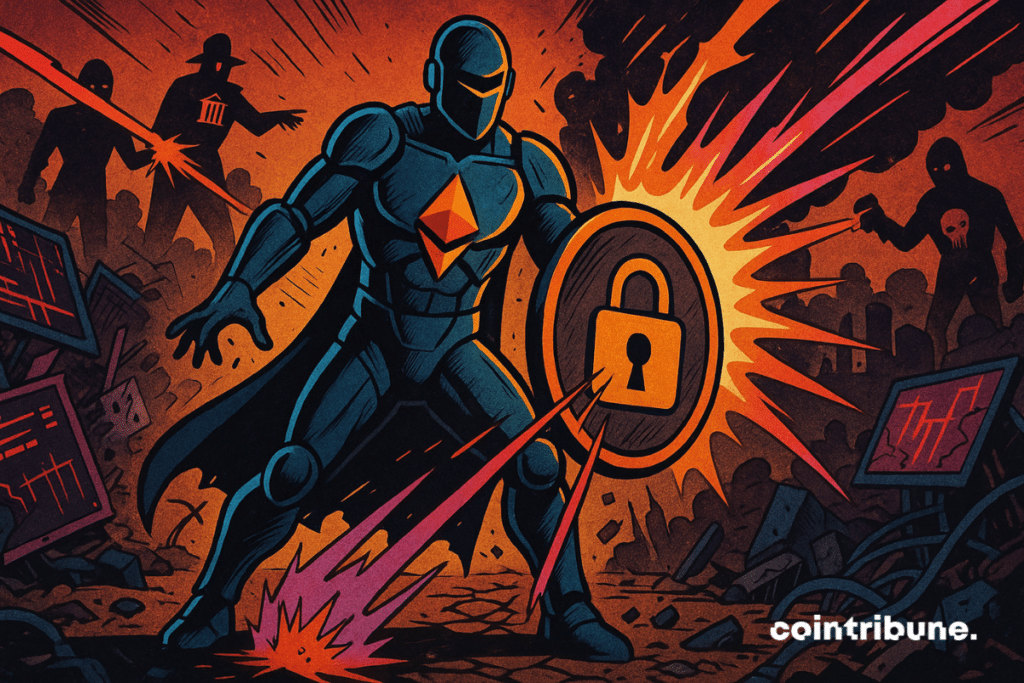Buterin Bets Big: Ethereum’s Survival Depends on Toughness & Stealth Moves
Ethereum’s co-founder drops a truth bomb—network resilience and privacy aren’t just features, they’re existential requirements.
The Privacy Play
Vitalik’s vision? A blockchain that shrugs off attacks like a bored cat batting away toys—while keeping your transactions more opaque than a hedge fund’s balance sheet.
Wall Street Won’t Like This
Decentralized, robust, and private? That’s three things traditional finance hates—right after transparency and fair taxation.
Ethereum either evolves into an uncrackable digital fortress or becomes another cautionary tale in crypto’s hype cycle graveyard.

In Brief
- Vitalik Buterin warns about the limits of the all-digital approach through the example of Nordic countries returning to the use of cash.
- Sweden and Norway, pioneers of cashless payment solutions, are reintroducing measures favorable to physical money.
- Buterin calls for enhancing Ethereum’s resilience so it can operate even during cyberattacks or massive outages.
- He also emphasizes confidentiality, which he deems indispensable to make Ethereum a credible substitute for cash.
Digital cash as a response to the fragility of centralized systems
Norway has adopted a measure requiring merchants to accept cash payments, despite being a global leader in the use of cashless payment solutions. In a post published on the social network X (formerly Twitter) on May 25, 2025, Vitalik Buterin used this reality to defend a more resilient and confidential Ethereum, capable of playing the role of a cash substitute.
He wrote:
Countries like Sweden and Norway show that even the most advanced societies can backtrack on dematerialization.
Long considered the ultimate models of a cashless society, these countries are now reassessing their dependence on centralized systems, particularly after observing their vulnerability to cyberattacks or infrastructure failures.
ETHUSDT chart by TradingViewThus, Sweden, which aimed for a total abandonment of cash by the end of this year, is now encouraging its citizens to reuse cash within a civil defense framework. In Norway, sanctions are even planned against merchants who refuse cash payments.
For Buterin, these subtle signals cannot be ignored. They serve as a direct warning to the crypto ecosystem. Even the most advanced digital structures remain vulnerable without autonomous backup solutions.
It is within this context that he calls for evolving Ethereum into a system capable of assuming this role of “digital cash”. According to him, this implies two major requirements:
- Resilience: Ethereum must be able to operate even under extreme conditions (network outages, infrastructure failures, cyberattacks), without relying on a centralized actor;
- Neutrality and portability: like cash, Ethereum must be usable universally, without access barriers or censorship;
- The role of a “safety net”: like cash in traditional economies, Ethereum must become a reliable alternative when other systems fail.
This plea comes at a critical moment when blockchain ambitions collide with geopolitical realities and the limits of current technologies.
Buterin’s message is therefore clear: to be a true digital sovereignty asset, Ethereum must first prove it can survive without the support of centralized structures it aims to replace.
Confidentiality and robustness: the task ahead for Ethereum
Following his remarks, Buterin also stresses another fundamental point: the need to strengthen confidentiality within Ethereum. “For Ethereum to compete with cash, it must also become private,” he writes bluntly.
The anonymity offered by cash cannot be ignored if the blockchain aspires to become a true monetary substitute. Even today, Ethereum’s default transparency of transactions constitutes a structural weakness for certain sensitive uses, which cash naturally protects.
The challenge is therefore twofold: preserving individual freedoms while respecting regulatory frameworks, an equation far from simple.
Technically, Ethereum is not yet up to this challenge. Transactions are fully traceable on the main chain. However, privacy solutions, whether “zero-knowledge proofs” or integrated into LAYER 2 systems, are still in development or controversial.
Moreover, some projects like Tornado Cash have been heavily sanctioned, which has slowed innovation in this area. Finally, network resilience still largely depends on external infrastructures, making any claim to autonomy equivalent to cash illusory in certain extreme situations.
Buterin’s position, although clear-eyed, raises questions on several levels. If Ethereum wants to embody a “digital cash,” it will need to undergo a profound transformation, both technical and philosophical. It will no longer be a matter of accelerating transactions or lowering costs, but of guaranteeing a level of autonomy, confidentiality, and robustness that only physical systems still offer today. This transformation has already begun, as evidenced by the recent drop in transaction fees, triggering as many challenges as hopes for the future of decentralized finance.
Maximize your Cointribune experience with our "Read to Earn" program! For every article you read, earn points and access exclusive rewards. Sign up now and start earning benefits.

